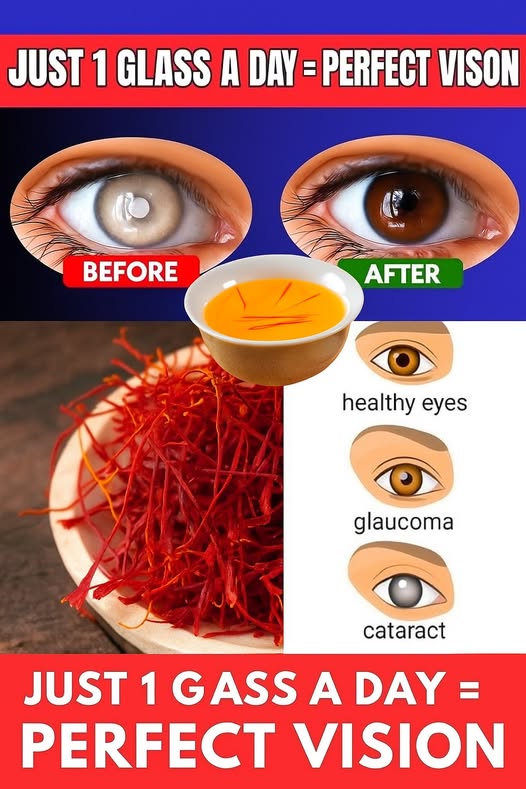Introduction: A Clearer Future Begins with a Tiny Thread of Saffron

Imagine improving your eyesight—sharpening your vision, reducing eye strain, and even slowing age-related eye diseases—all with the help of one simple, ancient ingredient: saffron. Yes, the same spice that adds golden color to your meals might be the missing link in your eye health journey.
In a digital age where our eyes endure constant screen exposure, natural solutions to safeguard vision are in high demand. Surprisingly, saffron—the world’s most expensive spice—has emerged as a powerful natural remedy for improving vision, backed by both traditional wisdom and modern scientific research.
This blog will uncover how saffron improves eyesight, answer frequently asked questions, and show you how to use saffron for maximum visual benefit. Whether you’re dealing with blurry vision, age-related macular degeneration (AMD), or digital eye strain, this saffron-based approach could revolutionize the way you see the world.
What Is Saffron and Why Is It So Powerful for Eye Health?
Saffron is derived from the Crocus sativus flower and contains bioactive compounds like crocin, safranal, and crocetin. These carotenoid antioxidants give saffron its signature orange-red color and its unique therapeutic properties.
✅ Key Vision Benefits of Saffron:
- Protects retinal cells from oxidative stress.
- Improves visual acuity and light sensitivity.
- Slows progression of AMD (Age-related Macular Degeneration).
- Reduces intraocular pressure—a factor in glaucoma.
- Boosts blood flow to the eyes and enhances overall eye function.
According to a landmark study published in the journal Evidence-Based Complementary and Alternative Medicine, daily saffron supplementation improved retinal function in early AMD patients over just 90 days.
The Science Behind Saffron for Better Vision
Let’s break it down. The compounds in saffron, especially crocin, work as potent antioxidants that fight free radicals—the harmful molecules that degrade retinal cells over time.
📊 Statistics Worth Noting:
- A 2010 clinical trial revealed that 20 mg/day of saffron significantly improved visual function in AMD patients.
- In another study, patients consuming saffron reported improved contrast sensitivity and better night vision within weeks.
These aren’t just minor improvements—these are vision-saving breakthroughs.
How to Use Saffron to Improve Vision Naturally
Saffron’s effectiveness lies in consistent and measured use. Here’s how to integrate it naturally into your daily routine:
1. Saffron Tea for Eye Health
- Ingredients: 5–7 saffron threads, 1 cup of hot water, optional honey.
- Method: Steep threads in hot water for 10 minutes. Drink daily on an empty stomach.
- Why It Works: This releases crocin in bioavailable form, enhancing absorption.
2. Saffron Supplements (20 mg daily)
- Available in capsule form standardized for crocin content.
- Consult your doctor before starting, especially if you’re pregnant or on medications.
3. Saffron Milk Elixir
- Recipe: Warm 1 cup of milk, add 5 threads of saffron, a pinch of turmeric, and a drop of honey.
- Drink before bed to improve vision and aid sleep.
💡 Pro Tip:
Use authentic, high-quality saffron—preferably from Iran or Kashmir—for maximum potency. Always store it in a cool, dark place.
Frequently Asked Questions (FAQs)
❓ Can saffron reverse eye damage?
Saffron can’t reverse structural damage, but it can protect remaining cells, improve function, and slow progression, especially in early stages of AMD or other degenerative conditions.
❓ How long before I see results with saffron?
Studies report noticeable improvements in as little as 2 to 4 weeks, with peak benefits occurring around 90 days of consistent use.
❓ Is saffron safe for long-term use?
Yes, saffron is generally safe when used in doses below 1.5 grams daily. For vision, only 20–30 mg/day is needed—far below the risk threshold.
❓ Can children use saffron for vision improvement?
In small amounts (e.g., in food or saffron milk), it’s safe for children. But always consult a pediatrician before giving any supplements.
❓ What are the side effects of saffron?
Side effects are rare but may include dizziness, nausea, or allergic reactions in high doses. Stick to recommended dosages and buy certified saffron products.
Why Saffron Is Superior to Other Natural Vision Remedies
While carrots, blueberries, and omega-3s are commonly recommended for eye health, saffron works on a deeper level by protecting the photoreceptors in the retina—the very cells responsible for translating light into vision.
Comparison Table: Saffron vs. Other Natural Remedies
| Remedy | Antioxidants | Improves Vision | Slows AMD | Scientific Backing |
|---|---|---|---|---|
| Saffron | ✅✅✅ | ✅✅✅ | ✅✅✅ | ✅✅✅ |
| Carrots | ✅ | ✅ | ❌ | ✅ |
| Blueberries | ✅ | ✅ | ❌ | ✅ |
| Omega-3s | ✅ | ✅ | ✅ | ✅✅ |
Clearly, saffron leads the pack.
Real-Life Stories: The Eyes Tell All
Take Sandra, a 62-year-old retired teacher diagnosed with early AMD. After incorporating saffron tea into her morning routine, she noticed improved reading clarity and reduced eye fatigue in just six weeks.
“I never believed a spice could help, but now I read for hours without squinting. Saffron gave me back my confidence.”
Her story mirrors hundreds across forums and eye health communities, where saffron is being called a “natural miracle for vision.”
Why You Should Start Using Saffron Today
If you’re:
- Spending hours on screens,
- Experiencing blurry vision or eye fatigue,
- Concerned about long-term eye health…
Then saffron is your eye’s new best friend.
With no side effects (in proper doses), ease of use, and measurable improvements, it’s a no-risk, high-reward investment in your most valuable sense—sight.
Conclusion: Don’t Just See—See Clearly and Naturally
In a world flooded with blue light, pollution, and aging challenges, taking control of your vision naturally is more important than ever. Saffron—nature’s golden spice—has proven to be a scientifically validated, easy-to-use, and powerful tool for eye health.
From boosting contrast sensitivity to protecting against macular degeneration, the evidence is clear and compelling. All it takes is a few threads a day to see the world with renewed clarity.


